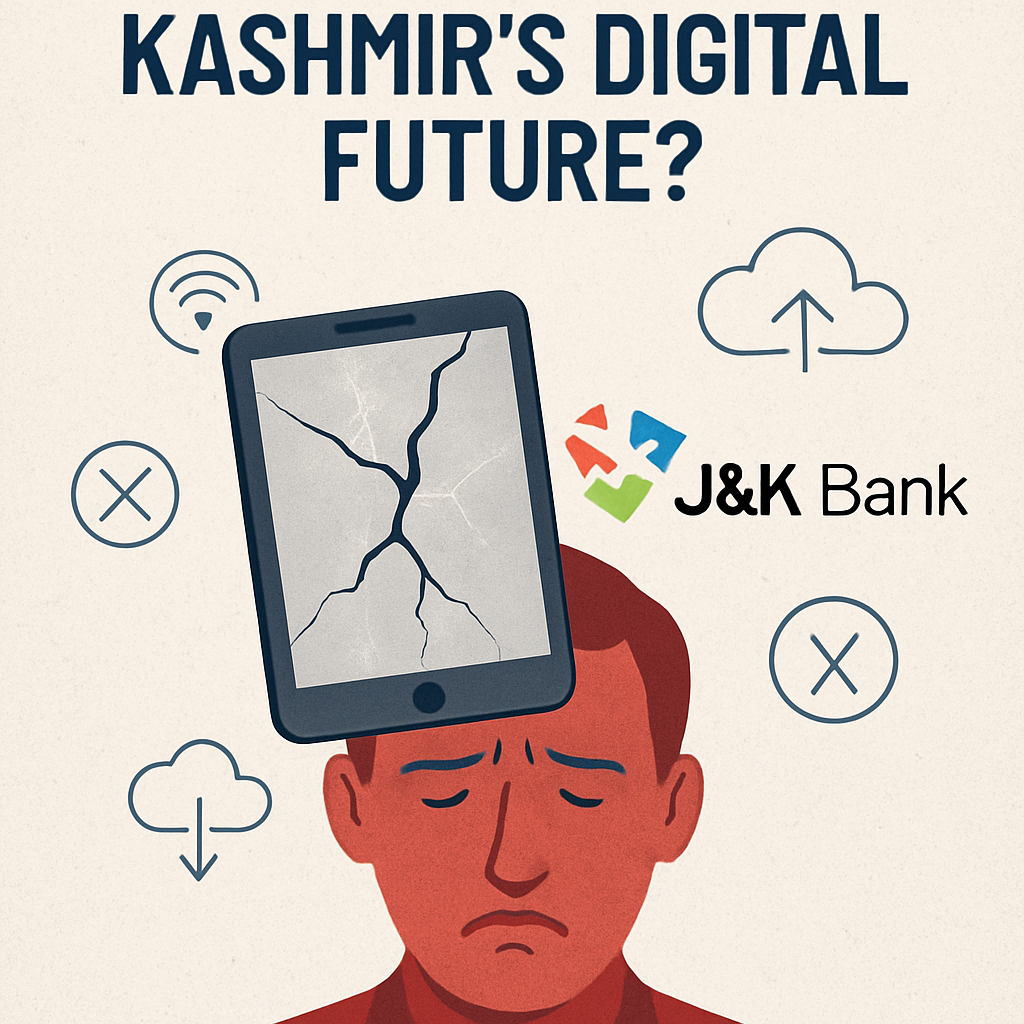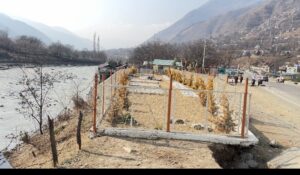Is J&K Bank Failing Kashmir’s Digital Future?

In a nation marching toward digital empowerment under the grand banner of Digital India, one institution in the Union Territory of Jammu and Kashmir has consistently left its customers digitally stranded—Jammu & Kashmir Bank. Despite technological upgrades and promises of enhanced service, the bank’s mPay Delight Plus app continues to falter, forcing Kashmiris to grapple with frequent outages, OTP failures, and service downtimes at critical hours.
While the Government of India promotes a seamless shift to cashless transactions, mobile wallets, and digital banking, the harsh reality for thousands of customers in Kashmir and beyond tells a different story—a reality where digital dreams collapse under server errors and system maintenace
From mPay to mPay Delight Plus: A Cosmetic Shift?
In early 2023, J&K Bank launched the much-anticipated mPay Delight Plus, an upgraded mobile banking app aimed at resolving past glitches and providing customers a modern interface. Hopes soared across the valley as the bank advertised better user experience and faster transactions.
But the transition from mPay to mPay Delight Plus turned out to be more of a cosmetic update than a functional leap. From the very outset, users complained of OTP delays,failed logins, and server overloads, particularly during high-demand periods. Students, traders, and salaried employees began to wonder whether the app’s “Delight” feature was merely in name
A Year of Recurring Outages: The Data and Public Outcry
Reports from various local news sources and public feedback reveal an alarming pattern: the app experiences breakdowns almost every week or two. Outages during festive seasons like Eid-ul-Fitr Eid-ul-Adha, and Diwali have become a tradition in themselves. According to The Kashmir Horizon, Kashmir Observer and kashmir Life, users were left helpless on Eid as the app failed to process even basic transactions.
In February 2025, users across Srinagar and Jammu experienced a two-hour-long blackout on the app during business hours. The issue, as reported by srinagar News Network, stemmed from an unplanned server disruption—yet again leaving users scrambling for alternatives.
Just this week, I witnessed a telling incident at my own shop. A customer came to buy fruits, chocolates, and other items before heading to visit his relatives. He tried four times to pay using mPay, only to fail each time. Embarrassed and frustrated, he had to leave without completing the purchase. A similar situation occurred a few days prior when I went to get a widal test done. Despite trying multiple times to make the payment digitally, I was unable to do so. The **server had been down for over four to five days, and the application had become sluggish and unresponsive.
These are not isolated incidents. Stories like these are widespread and form a collective grievance across Kashmir. Just yesterday, I received a notification from J&K Bankstating that its digital services would remain unavailable from 12:30 PM to 5:30 PM due to maintenance. For many businesses that rely heavily on digital payments, that effectively meant the end of business for the day.
Real-life Inconvenience: Dehradun Diaries and Beyond
As someone’s who moved to pursue his education out of state as I personally experienced the fragility of J&K Bank’s digital ecosystem in Dehradun during my master’s study in a city where nearly every service—from hostel rent to photocopying—operated on UPI and digital payments, a failed transaction meant serious trouble.
There were countless instances where we students stood in queues at ATMs or had to request friends with SBI or HDFC accounts to pay on our behalf. Eventually, many of us.
chose to switch our accounts entirely to other banks offering stable and reliable digital services.
This wasn’t an isolated experience. Students from Kashmir studying in Delhi, Chandigarh, and Bengaluru echo the same frustrations—J&K Bank’s app often doesn’t even allow users to set a UPI PIN without visiting a branch or activating a debit card. For a generation trained to live online, these hurdles belong to a bygone era.
Digital India vs Ground Reality in Kashmir
The contradiction is stark. India, under its flagship Digital India mission, promotes apps like BHIM, UPI, and digital wallets. Billboards, TV commercials, and government campaigns encourage even small-time vendors to go cashless.
But in Kashmir, people are often forced to return to cash—not out of preference, but due to systemic digital failure. The result is not only inconvenience but humiliation, as many customers find themselves unable to pay in public spaces like petrol pumps, supermarkets, or airports.
Is J&K Bank Failing Kashmir’s Digital Future?
While other public sector and private banks ensure consistent digital availability—some achieving 99.99% uptime—J&K Bank remains marred by inconsistency. Regular server maintenance, unpredictable downtimes, and a lack of real-time customer support have eroded public trust.
Earlier this year, the Kashmir Trade Alliance (KTA) issued a public statement demanding urgent intervention and transparency from J&K Bank. They highlighted the losses faced by shopkeepers, the frustration of customers, and the gap between promise and performance.
For an institution that holds a dominant market share in Jammu and Kashmir, this level of digital underperformance is unacceptable—and ultimately, regressive.
A Way Forward?
If J&K Bank truly wishes to align itself with the vision of Digital India, it must move beyond app rebranding and public claims to take meaningful, structural steps. First and foremost, the bank needs to develop a robust backend infrastructure capable of handling high traffic seamlessly during peak hours, especially during festivals and busy business periods. Alongside this, it is essential to implement a streamlined OTP delivery systemand a hassle-free onboarding process for UPI and other mobile payment options—so that users aren’t left frustrated trying to activate basic services.
Equally important is the establishment of a responsive and well-trained customer support team that offers real-time troubleshooting and genuine human assistance, rather than relying on automated replies or inaccessible helplines. Lastly, the bank should conduct independent third-party technology audits to identify recurring technical bottlenecks, modernize its application architecture, and ensure long-term digital reliability for its users.
I sincerely hope J&K Bank addresses these bugs and glitches—because until it does, Kashmiris will continue to be haunted by error messages and server timeouts, even as the rest of the country strides ahead into the digital age.
Author- Peer Mohammad Amir Qureshi
Note This story is Not Edited by The KashPost Side this is edited and report By Amir Qureshi



